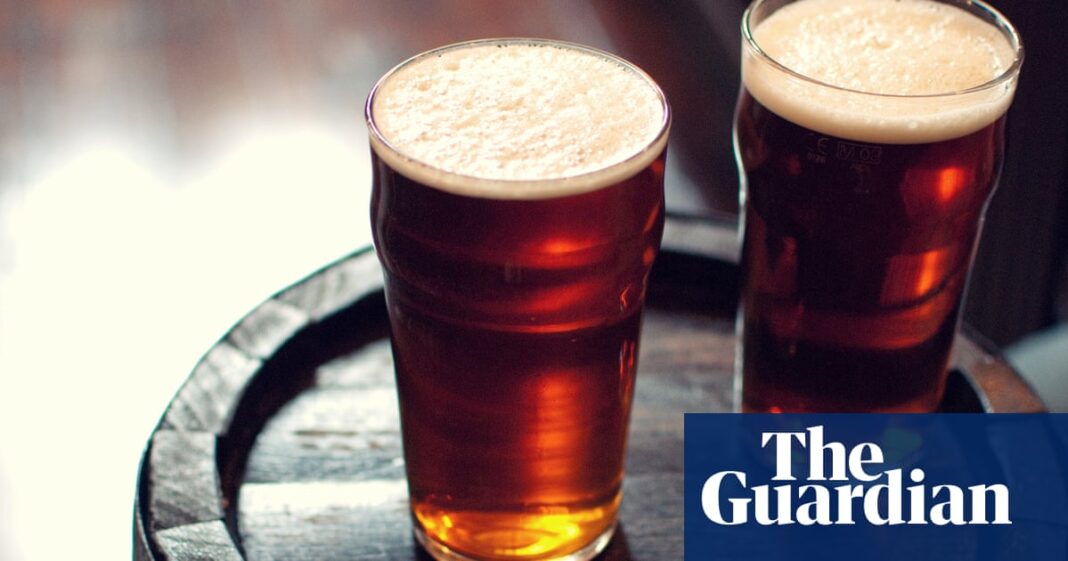The boss of Wetherspoon’s has urged the UK government not to heed calls to restrict pub licensing hours or swap pint glasses for smaller schooners, arguing that pubs have “changed radically in recent decades”.
Amid reports, denied by the health department, of moves to cut alcohol consumption, Tim Martin, the pub chain’s chief executive, said the industry had moved away from a focus purely on beer, and Pepsi, tea and coffee were now the most popular drinks in his establishments.
He dismissed as “slightly daft” the recent and widely reported academic study proposing a switch to a two-thirds of a pint glass size – as used in Australia, where they are known as schooners.
A government spokesperson said: “Neither of these proposals are being considered.”
His remarks came as Wetherspoon’s, which has 800 pubs and is aiming for 1,000, reported a 73.5% increase in pre-tax profits to £73.9m in the year to 29 September, with like-for-like sales up 7.6%. In the last nine weeks, like-for-like sales growth slowed to 4.9%.
The company said it would pay a dividend – of 12p a share – for the first time since 2019.
Martin said: “The word pub may have a misleading connotation for some ministers and researchers. For example, Wetherspoon’s highest selling-draught product by far is Pepsi. Coffee and tea volumes, which are not in the draught category, are approximately double those of Pepsi. The reality is that products sold in pubs have radically changed in recent decades.”
The comments came after the public health and prevention minister, Andrew Gwynne, suggested at a Labour fringe event “tightening up on some of the hours of operation”, although Keir Starmer later dismissed as “nonsense” the suggestion that the party would force pubs to shut early. The prime minister told LBC radio’s Nick Ferrari at Breakfast: “This is not government policy. We are not going to do it.”
Since 1988, pubs have been allowed to open all day, having previously been required to close for about two or three hours each afternoon. After the further relaxation of licensing laws in 2005, Wetherspoon’s pubs have been able to stay open until midnight on weekdays and until 1am on Fridays and Saturdays.
Martin said that pubs, clubs and restaurants accounted for 90% of beer sales in the early 1980s, but this had fallen to 40%, probably because of a growing price disparity with supermarkets, which pay virtually no VAT on alcohol, compared with 20% at pubs.
Any restriction of pub opening hours was “likely to be replaced by ‘off-trade’ consumption at home and in other ‘unregulated’ environments”, he said.
after newsletter promotion
Research from the University of Cambridge found that switching away from pint glasses reduced the daily average volume of beer, lager and cider sold by almost 10%, although there was a slight increase in the amount of wine bought.
Martin rejected the idea that the use of schooners would reduce alcohol consumption, saying it would lead to more drinking at home or in parks. He added: “For example, our Aussie cousins, notorious guzzlers, already use schooners without any noticeable reduction in consumption.”
The government is considering banning smoking in some outdoor spaces – pub gardens, outdoor restaurants and outside hospitals and sports grounds – and health experts have welcomed the plans.
Martin told the Guardian that Wetherspoon’s introduced the first non-smoking pubs in the UK, before a nationwide ban. “On balance, looking at industry concerns and a diluted health argument for outside smoking, I wouldn’t extend the ban to gardens. If introduced, it would probably be a political gesture only.”
He also used the annual results to warn once more against any further Covid-19 lockdowns, as he has in previous annual results since restrictions eased. He cited research that found Sweden, which did not lock down, had a Covid-19 fatality rate “of about half the UK’s” and that “the worst performer, by some margin, was Peru, despite enforcing the harshest, longest lockdown”.


